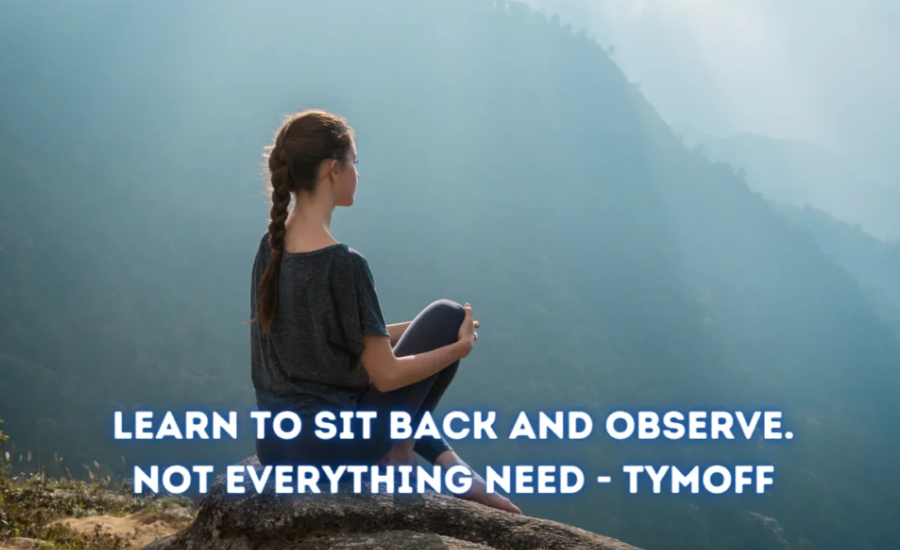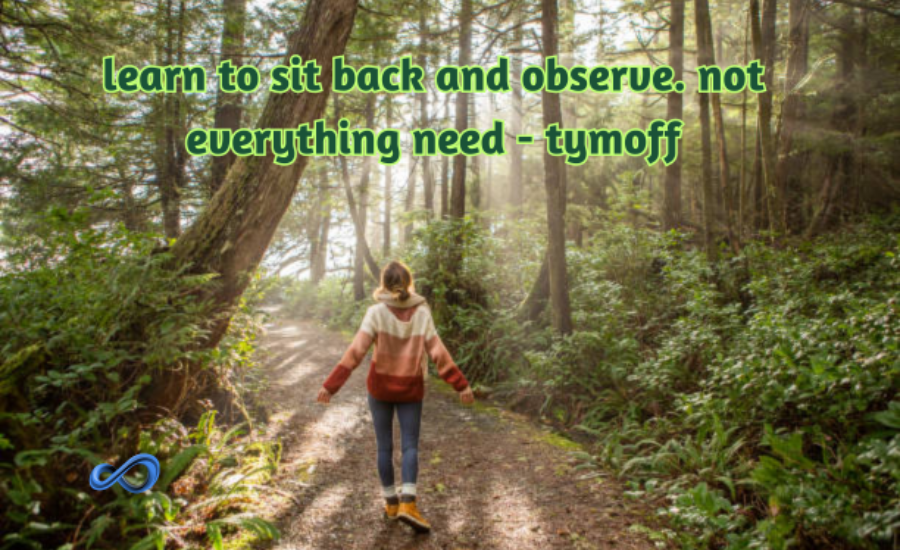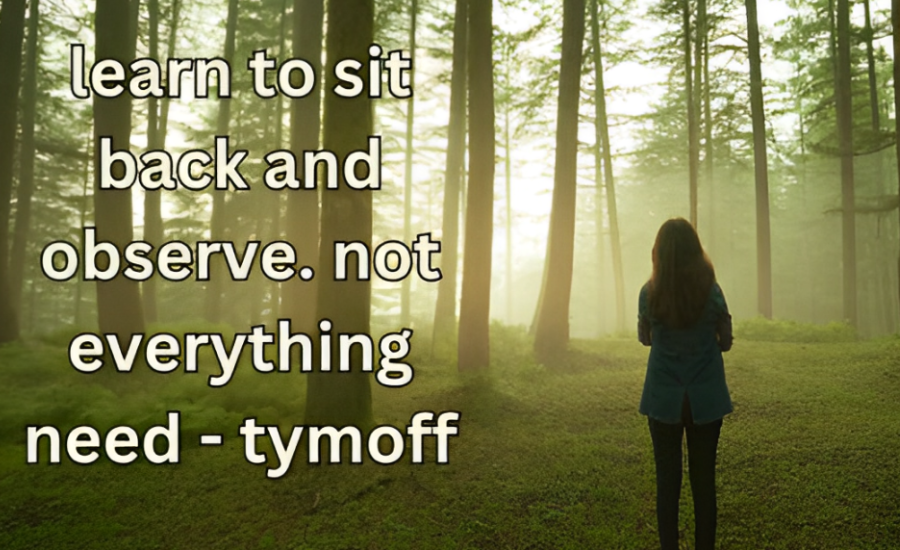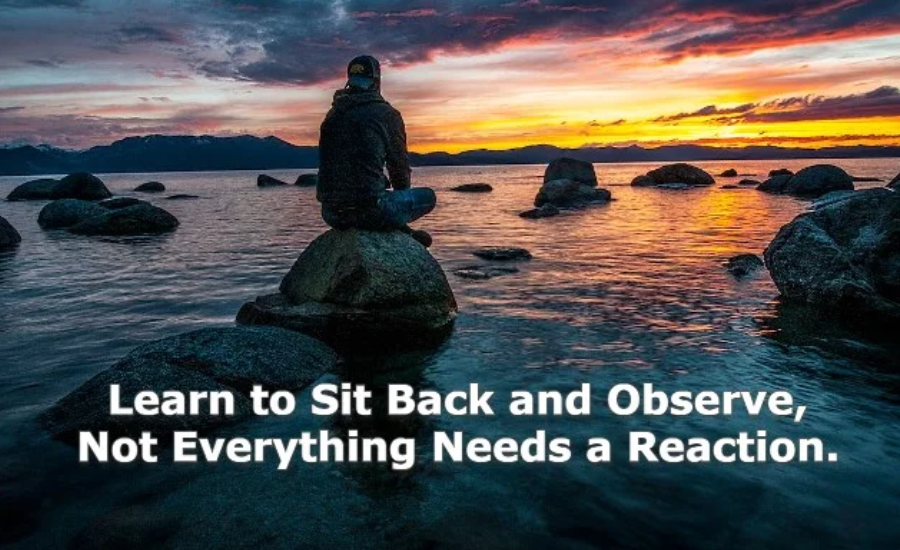learn to sit back and observe. not everything need – tymoff Have you ever experienced the feeling of making a hasty decision in the heat of the moment, only to wish you could take it back later? In today’s fast-paced environment, cultivating the ability to pause and reflect rather than reacting on instinct is an invaluable skill. This practice not only helps us minimize unnecessary stress but also enhances our capacity to make informed choices. Let’s explore the transformative power of observation and discuss practical steps you can take to integrate this skill into your daily life.
The Principle of learn to sit back and observe. not everything need – tymoff

Definition and Significance
Observation transcends mere sight; it involves attentively noticing the finer details without hastily forming judgments or taking action. This intentional approach allows us to grasp the dynamics occurring both around and within us. By honing this skill, we can navigate life’s challenges more effectively, steering clear of impulsive responses that often result in errors.
Historical Context
Historically, influential thinkers and leaders have underscored the significance of observation. From ancient philosophers such as Socrates, who championed introspection, to contemporary mindfulness practices, the importance of being observant has long been regarded as a fundamental aspect of wisdom.
The Case for Not Responding to Everything
Emotional Intelligence
Constantly reacting to every situation can drain our energy and be counterproductive. Emotional intelligence is the ability to recognize and comprehend both our own feelings and those of others. By prioritizing observation, we create an opportunity to process our emotions more effectively, allowing for a more thoughtful and intentional response.
Minimizing Unnecessary Stress
Instant reactions frequently result in heightened stress levels and potential conflicts. By practicing observation, we empower ourselves to make more deliberate choices about when and how to engage, enabling us to approach challenges in a constructive manner and ultimately lowering our overall stress.
The Advantages of Practicing Observation
Deeper Insight
By taking the time to observe, we cultivate a richer understanding of both situations and individuals. This heightened awareness can foster stronger relationships and enhance our ability to solve problems effectively.
Better Decision-Making
Engaging in observation enables us to collect more relevant information before reaching conclusions. As a result, our decisions are more informed and have a higher likelihood of success.
Ways to Cultivate Observation Skills

Mindfulness Practices
Mindfulness serves as an effective method for sharpening our observation abilities. By immersing ourselves in the present moment, we can become aware of nuances and details that we might typically overlook.
Engaged Listening
Engaged listening means fully focusing on what is being communicated rather than merely hearing the words. This active involvement can significantly enhance our observational skills and deepen our understanding of conversations.
Mindfulness Strategies to Enhance Observation Skills
Meditation Techniques
Consistent meditation practice can quiet the mind and improve our capacity to observe without bias. Begin with just a few minutes each day, gradually extending the time as you become more comfortable with the practice.
Breathing Exercises
Engaging in simple breathing exercises can also be beneficial. By focusing on our breath, we can anchor ourselves in the present moment, heightening our awareness of the environment around us.
The Importance of Active Listening in Enhancing Observation
Strategies for Effective Active Listening
To enhance your active listening skills, focus on fully connecting with the speaker. Maintain eye contact, nod to indicate comprehension, and pose clarifying questions when needed.
Advantages of Active Listening
Practicing active listening not only sharpens our observational skills but also fosters deeper, more empathetic relationships with others.
Case Studies: Achieving Success through Observation
Business Leaders
Numerous successful business leaders credit their achievements to their ability to observe and interpret market trends, customer preferences, and team dynamics. For instance, Steve Jobs was renowned for his exceptional observational skills, which played a crucial role in driving innovation and steering Apple towards success.
Personal Development Narratives
On a personal level, individuals who embrace observation often experience increased self-awareness and personal growth. By recognizing their own behavioral patterns and tendencies, they are better equipped to navigate their lives and make informed decisions.
Frequent Traps of Overreacting

Stress and Anxiety
Overreacting often contributes to heightened levels of stress and anxiety. Developing the habit of observation can help reduce these negative impacts, enabling us to handle situations with greater calmness and clarity.
Strained Relationships
In relationships, overreacting can lead to misunderstandings and unnecessary conflicts. Practicing observation allows us to respond more thoughtfully, leading to healthier and more constructive interactions with others.
Steps to Cultivate a Calm and Non-Reactive Mindset
Recognizing Triggers
The first step in cultivating a non-reactive mindset is to recognize the situations or emotions that trigger your immediate responses. Building this awareness allows you to pause and choose a more thoughtful reaction.
Establishing a Tranquil Environment
Creating a calm space can enhance your ability to observe. Whether it’s a quiet corner in your home or a serene spot in nature, having a distraction-free environment supports reflection and thoughtful observation.
The Importance of Patience in Effective Observation
Cultivating Patience
Patience is essential for meaningful observation, as it gives us the ability to pause and wait for the appropriate moment to act, instead of reacting on impulse.
Lasting Advantages
Nurturing patience brings long-term benefits, such as enhanced relationships, improved decision-making, and a calmer, more centered mindset. These positive outcomes reinforce the value of practicing patience in daily life.
The Role of Observation in Professional Environments
Strengthening Workplace Relationships
In a professional environment, observation helps us gain a deeper understanding of our colleagues, fostering better communication and improving overall workplace dynamics. This approach enables us to respond in ways that are more supportive and productive.
Improved Leadership Strategies
For managers, careful observation of their team’s behaviors and interactions offers valuable insights into employee performance and morale. This awareness can lead to more effective management strategies, contributing to a more unified and motivated team.
The Role of Observation in Personal Life
Strengthening Personal Relationships
Observing the people we care about helps us better understand their emotions and needs, fostering deeper connections and more supportive relationships with our loved ones.
Boosting Self-Awareness
Observation also plays a crucial role in developing self-awareness. By closely monitoring our own thoughts and actions, we can identify areas for growth and make meaningful improvements in our personal lives.
Obstacles to Developing Strong Observation Skills
Conquering Impulsiveness
A significant hurdle in mastering observation skills is overcoming our inherent impulsiveness. While it requires consistent practice and patience, the benefits of cultivating this ability are substantial.
Managing Distractions
In our fast-paced world, distractions are omnipresent. Developing the skill to focus and observe effectively, despite these interruptions, is essential for enhancing our observational abilities.
Final Words
In today’s fast-paced world, learning to sit back and observe can be a transformative skill. Not everything requires an immediate reaction; sometimes, taking a step back allows us to gain deeper insights into situations. By honing our observation skills, we can cultivate patience, which empowers us to respond thoughtfully rather than impulsively. This intentional practice not only minimizes stress but also enhances our understanding of ourselves and others. In professional settings, it strengthens workplace relationships, while in personal life, it deepens connections with loved ones. Ultimately, embracing the principle that not everything needs a reaction helps us navigate challenges with clarity and intention, leading to more informed decisions and richer interactions.
Stay in the loop for upcoming updates and alerts! Insight Rays



